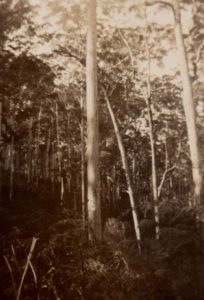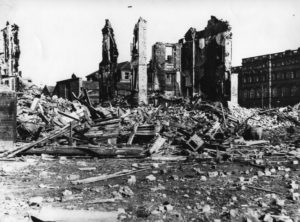Arrival in Australia, all felts and tweeds with the temperature one hundred and eleven degrees Fahrenheit, I wasn’t exactly daunted, just a bit knocked up. The open space I was nominated to was crowded with the biggest trees imaginable. They were beautiful, but I would gladly have exchanged them for the dirty smoky city I had so recently left.
The words of my mother, Mary McCaughan (nee Wilson)

We arrived in Fremantle on board the P&O Steam Ship Mooltan in 1949 as part of the first wave of post-war migration. Bands played and locals turned out to welcome us. We sweltered in our best clothes worn for our first day in our new country. They were more suited to January in Scotland than the searing summer heat of Western Australia. People took one look at me, all pockmarks and skinny limbs, and thrust chocolate bars at me. Mum’s youngest sister Helen came up from Manjimup to greet us. Helen, having been without the comfort of any family for over a year, took one look at my mother and dissolved into a flood of tears. She was pregnant and badly suffering both morning and homesickness.
The next part of the story is hazy to me. My parents were obviously left to their own devices and I remember being told that Uncle Doug had been selected to attend a dairy-farming training course in Harvey. Helen was joining him there. From Fremantle we caught the train to Bunbury being held up on the way by a tree which had fallen across the line. After that we somehow made our own way to the farm.

Meanwhile, a well-meaning woman from a group called Friends to Migrants greeted us and invited us to her home for lunch. Not wanting to offend, Mum and Dad with me in tow, followed the woman’s directions. A short walk through Fremantle to find the bus stop had my parents gasping with thirst so they entered the front bar of a hotel to buy a lemonade. My mother was deeply affronted when told that, as a woman, she was not allowed in the bar. Discrimination of this kind was unheard of in Scotland, and unease set in about what to expect in this new country.
We caught a bus and tramped up a long hot hill to be greeted by a house full of noisy, greyhound dogs and a greasy roast dinner served on a table covered with newspaper. With the heat and the dogs, Mum said her appetite vanished and she already felt homesick as she thought of her mother’s table spread with a gleaming white tablecloth.
 My parents had left behind a materially deprived society, but it was, by all accounts intellectually stimulating and vibrant, as well as rich in intellectual and cultural experiences. My parents met in the highlands where they both enjoyed hiking, exploring the peaks and glens with their friends.
My parents had left behind a materially deprived society, but it was, by all accounts intellectually stimulating and vibrant, as well as rich in intellectual and cultural experiences. My parents met in the highlands where they both enjoyed hiking, exploring the peaks and glens with their friends.
Although much of Glasgow had not recovered from the exploitation and impoverishment caused by the industrial revolution, it was a city of art and architecture and libraries. It was also a city alive with political debate. My parents read Marx and other writers who proposed equality of class, race and gender and belonged to the Young Socialists Society. Mum’s brother, Peter worked as the secretary for James Maxton, the Scottish Parliamentarian. A socialist and a pacifist, Maxton was a gifted orator who Churchill labelled as “the greatest parliamentarian of his day”.
Hiking in the Highlands
Theatre and opera were usually affordable, even to the working class. My father had a fine tenor voice and was passionate about music and opera. He remembered hearing Richard Tauber, whose shows were always fully booked. Tauber, a socialist believed music should be for all people and John felt privileged to be among the working-class crowd when the singer came out into the street after the performance and sang. Another visitor to Glasgow was Paul Robson, who my father loved, not just for his rich bass voice, but because he too was a socialist. Robson was from America where even as a celebrity he was treated as a different sort of animal because of his colour. When invited to sing in Lenin’s Russia he was impressed and delighted to find himself, for the first time in his life, on an equal footing with other men. When Mary and John arrived in Australia they had come from a society that was vital and vibrant with political and cultural ideals
Mary Wilson and John McCaughan Oct 4th, 1944
 Mary and John were married during the war in 1944. My mother’s wedding dress was a testament to her creativity with a sewing machine. It was nearly the end of the long, bleak war-years, with everything in short supply. Some of my mother’s friends were Jewish and she said they always seemed to know how to find their way around the shortages. They were able to find a precious zipper and the material for the wedding dress. They then took the leftover
Mary and John were married during the war in 1944. My mother’s wedding dress was a testament to her creativity with a sewing machine. It was nearly the end of the long, bleak war-years, with everything in short supply. Some of my mother’s friends were Jewish and she said they always seemed to know how to find their way around the shortages. They were able to find a precious zipper and the material for the wedding dress. They then took the leftover
material and made the hat. Mum sewed a whole trousseau of underwear from a new silk parachute that fell off the back of a truck. Wedding cakes in these times were often made of white cardboard decorated with flowers. They looked good in the photo, but the actual cake underneath was only a tiny cube. Mum and Dad had a real wedding cake made by my father’s uncle who was a baker. Added to this rare treat was whiskey that came via the officer’s mess as well as from a friend whose father owned a pub.






